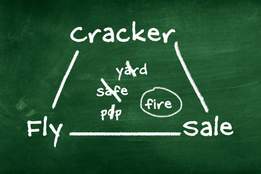1
: any of various devices for winnowing grain
2
: an instrument for producing a current of air: such as
a
: a device that is held in the hand and moved back and forth to cool a person and that is usually shaped like a segment of a circle and composed of material (such as feathers or paper) mounted on thin rods or slats moving about a pivot so that the device may be closed compactly when not in use
b
: a device that consists of a series of vanes radiating from a hub rotated on its axle by a motor
a ceiling fan to stir the air
c
slang
: an airplane propeller
3
a
: something resembling an open fan (such as the leaf of certain palms)
b
: a gently sloping fan-shaped body of detritus
especially
: alluvial fan
fanned; fanning
1
a
: to drive away the chaff of (grain) by means of a current of air
b
: to eliminate (chaff) by winnowing
2
: to move or impel (air) with a fan
3
: to blow or breathe upon
the breeze fanning her hair
4
a
: to direct a current of air upon with a fan
b
: to stir up to activity as if by fanning : stimulate
fanning the fires of nationalism
5
archaic
: wave
6
slang
: spank
7
: to spread like a fan
the peacock fanned his tail
8
: to strike (a batter) out in baseball
9
: to fire a series of shots from (a single-action revolver) by holding the trigger back and successively striking the hammer to the rear with the free hand
1
: to move like a fan : flutter
2
: to spread like a fan
—often used with out
the searchers fanned out
1
: an enthusiastic devotee (as of a sport or a performing art) usually as a spectator
2
: an ardent admirer or enthusiast (as of a celebrity or a pursuit)
science-fiction fans
Love words? Need even more definitions?
Merriam-Webster unabridged











Share